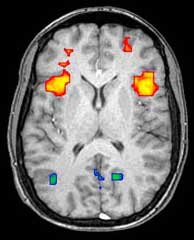
The brain health index is a computer program created by scientists at the Universities of Edinburgh and Glasgow. An article explaining this development was recently published in the International Journal of Stroke. According to the authors, the brain health index combines all of the information available through brain scans to arrive at a quantifiable assessment of brain injury.
Two of the important indicators of brain deterioration are cerebral small vessel disease (SVD) and brain atrophy, both of which increase as a person ages. These conditions are also significant risk factors for dementia and stroke. When attempting to identify brain damage and its potential results, imaging techniques have been limited thus far. Until now, there has been no single way to measure the results of brain scans when taken together.
In order to test the efficacy of the brain health index computer program, researchers used it to evaluate the brains of stroke victims, patients with lupus, and healthy participants of working age. All in all, the brain health index was ten times more accurate in predicting cognitive function after stroke and cerebral small vessel disease when compared with the methods available to doctors now. Although the brain health index is not yet approved for use in clinical practice, it may represent the next phase of science for early detection of cognitive decline and dementia after stroke.
Using the brain health index, doctors may be able to identify early signs of cognitive decline due to aging, vascular disease, and neurological disorders. Some of these problems can be slowed or warded off through lifestyle changes and medication. Until then, doctors are able to use brain scans to determine whether or not a stroke has occurred. Medical professionals are also required to understand and address the risk factors for stroke and to intervene immediately upon recognizing stroke symptoms. With timely treatment, doctors can lower the risk of brain damage and death resulting from stroke.
What is a stroke?
A stroke can happen in one of two ways: either a blood vessel ruptures in the brain or blood supply to the brain is interrupted. In either scenario, the brain is deprived of oxygen, which is necessary to prevent death of brain cells. Once brain cells begin to die, the brain suffers irreversible damage or may even lead to death. The extent of brain damage is associated with the amount of time during which the brain experiences lack of oxygen. This is why timely treatment for stroke is essential.
How common is stroke?
According to the CDC, stroke is the fifth leading cause of death among Americans. The American Heart Association reports that approximately 795,000 strokes occur every year in the U.S., 610,000 of which are first-time strokes and 185,000 of which occur in people who have suffered a stroke previously. Among stroke survivors in America, between 15 and 30 percent have a permanent disability and four million others have some form of impairment.
How do you know you’re having a stroke?
The symptoms of stroke vary from person to person; however, common signs of stroke include sudden onset of numbness or weakness in the arms, legs, or face; severe headache; mental confusion; difficulty speaking; dizziness; loss of balance or coordination; and difficulty walking. If you experience any of these symptoms, it is imperative to seek medical help right away.
What happens if my doctor failed to diagnose a stroke?
As a general rule of thumb, the more time passes after a stroke begins, the more damage to the brain that occurs. As more tissue is deprived of oxygen and subsequently dies, the prognosis worsens for the patient in terms of permanent cognitive function. In other words, doctors must initiate rapid treatment in order to preserve brain health. If your doctor fails to diagnose or is delayed in diagnosing and treating stroke, the results can be catastrophic.
If you or a loved one suffered a stroke and experienced long-term problems, medical negligence may be to blame. You have limited time to investigate your case and file a claim for medical malpractice in New Jersey, so speaking with an experienced attorney as soon as possible is imperative. For additional information and a free consultation, contact Fronzuto Law Group at 973-435-4551. A member of our legal team will be happy to discuss your case and explain your legal options.

